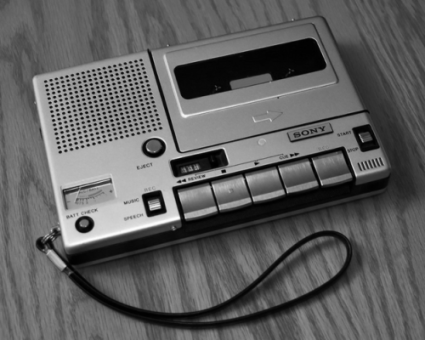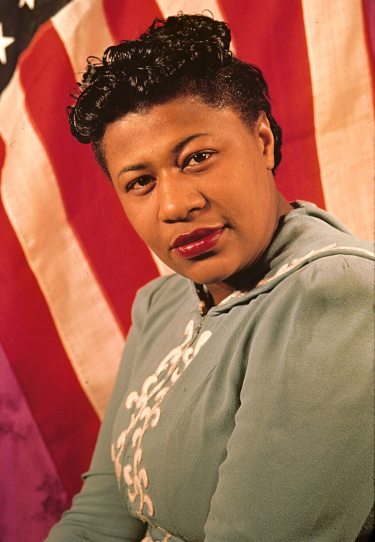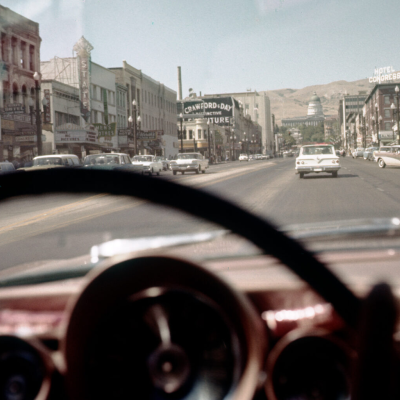.
.
“High John Saw the Holy Number,” a story by Con Chapman, was a short-listed entry in our recently concluded 59th Short Fiction Contest, and is published with the consent of the author
.
.
___
.
.
photo by Joe Haupt/(CC BY-SA 2.0)

.
.
High John Saw the Holy Number
by Con Chapman
.
….. I’d been looking for a job for a while when this guy Tom I knew said they were looking for somebody part-time at the music store where he worked. They sold sheet music and instruments and supplies like reeds for saxophones. Tom worked there because he played in a band and liked the employee discount for guitar strings.
….. I started working there Saturday afternoons until closing when nobody else wanted to, then started getting more hours. In addition to Tom there was this little guy Charles who wore wire-rimmed glasses and had a goatee. He looked like Trotsky or some other Russian revolutionary – I wasn’t into Marx so I could never keep them straight.
….. Charles and I worked together Saturdays because our shifts overlapped; he was there the early part of the day, I was there from two-to-ten, like I said. One day when things were kind of slow Charles showed me a tape recorder he kept under the counter.
….. “Listen to this,” he said as he pushed a button. A woman’s voice came on and started rambling on about something, how her father had a lot of property in South Boston when she was a little girl but somebody gypped him out of it and now she had to sleep in the subway station instead of living a life of “comfort and ease.” That’s how she put it – it sounded strange to my ears, real old-fashioned.
….. “Who is she?” I asked Charles.
….. “I don’t know, just some old lady who comes in here and talks. I’ve got a collection of ’em. Harvard Square is like the disassociating crazy person capital of America.”
….. “So she didn’t know you were taping her?”
….. “No.”
….. “Isn’t that . . . illegal or something?”
….. “I’m not a cop,” he said, shrugging his shoulders. “I’m not trying to arrest her.”
….. “What are you going to do with all your tapes?”
….. “I’m thinking of doing a conceptual art work. I’d have a room with like big blow-up pictures of crazies, and then these tapes droning on tables all around.”
….. “Sounds like it’d be a cacophony.” I wasn’t showing off using that word, it was just the right one, and anyway I didn’t want Charles to think I was just some dumb guy who hung around with Tom’s band.
….. “It’d have to be a pretty big gallery,” he said, thinking out his masterpiece. “I’d keep the volume low so each station would be like a little short story in a collection or a chapter in a book.”
….. “Cool,” I said, but more to be agreeable than meaning it. It sounded pretentious to me, the sort of low-octane posing that fakers try to pass off as art, as if playing a bunch of tapes of other people required the same amount of effort it took to sit down for a couple of years and write a novel.
….. “You’re here ’til closing, right?” he asked.
….. “Yeah.”
….. “There’s one guy who I really want to get on tape but I’m never here when he comes in.”
….. “Who’s that?”
….. “This old Black guy – he’s really crazy. He came in once before I started taping people. It’s like James Joyce stream-of-consciousness stuff. He starts stringing metaphors together, talking about Miss Sadie’s cabbage patch, how he caught a rabbit once, where he used to live in Roxbury when he was a kid. He’s my Great Black Whale.”
….. “So why don’t you just stick around and tape him?”
….. “I’ve got a party to go to. I haven’t worked here for three years to give up the privilege of Saturday nights off. Say – would you watch for him and tape him for me?”
….. “Uh, sure, I guess. I mean if he comes in and I’m not waiting on anybody else.”
….. “Great. I’ll put in a new tape, and you just press down on the ‘play’ and ‘record’ buttons at the same time.”
….. “Okay. Is there a tape in there now?”
….. Charles got up and went over to where the owner kept the blank cassettes. “Shrinkage,” he said as he unwrapped one and put it in his tape player.
….. Charles left when his shift was over and I was there by myself. Things were quiet. People who just wanted to buy recorded music didn’t usually come to our store, they went to Strawberries or the Coop or someplace with a bigger selection. A guy came in looking for sheet music for a saxophone quartet by Glazunov – we didn’t have it but I ordered it for him. A Japanese family came in with their kid – probably visiting Harvard – looked around for a while and, after thanking me profusely for nothing at all, left. I sold some violin strings. It was a slow night for some reason.
….. Then this old Black man came in, wearing a long overcoat even though it was just October. He had a clean white shirt on, buttoned up to the neck. He had a hat on his head, the kind men my father’s age used to wear. He looked like a street corner preacher.
….. He looked around and when he saw me he walked over to the counter I was behind.
….. “Have you got it?” he asked – totally off-the-wall. I figured maybe this was the guy Charles was talking about, so I pressed the two buttons on the tape recorder to start it.
….. “Have we got what?”
….. “The record – have you got the record?”
….. “What record?”
….. “High John saw,” he said.
….. It was him all right – had to be – so I decided to play along.
….. “I don’t think so. How does it go?”
….. The man began to sing: “High John saw – the holy number, zig-zag lightning and the rolling thunder. High John saw – the holy number, way in the middle of the air.”
….. He had a deep voice but clear. When he was done he looked at me with a look that went right through me. “Have you got that record?”
….. “I don’t believe so. Who’s it by?”
….. “Soul Stirrers. Have you got it?”
….. “I can check.” I fiddled around with some papers as if I was trying to look it up. I figured I’d string him along for awhile. “Where’d you first hear it?”
….. “I first heard that song in church. It was a revelation to me.”
….. “What was it like?”
….. “It was like red gasoline oil. It was like a burning sunset. It was like nothin’ I’d ever seen before.”
….. “You say you seen the song?” I asked, playing dumb. “How do you see a song?”
….. “It’s way up in the middle of the air, just like the song says. It’s like Ezekiel’s wheel.”
….. “I don’t know what that is.” I knew that was in the Bible, but I’d never understood it.
….. “It’s a wheel within a wheel, just like them bicycle spokes when that wheel gets goin’. Just like the wheels of a car when it gets goin’. You ought to read the Bible and learn that.”
….. He had sweat on his brow now – he was really into it. “You ought to write the record company . . .”
….. “Okay . . .”
….. ” . . . write the record company, see if you can git it.”
….. “Okay, we will. Have you got the address?”
….. “You oughta have it. You oughta have it in that big book thar.”
….. He pointed to the Schwann catalog. He was right, it would probably be in there if it existed, but I had my doubts whether there was any such song as “High John Saw the Holy Number.”
….. I thumbed through the catalog and looked for The Soul Stirrers. I knew Sam Cooke had sung for them so I looked under his name too. Nothing, but that didn’t mean the song didn’t exist; it just meant there wasn’t an album by that name.
….. “They don’t have it listed,” I said. “Sorry.” I really was sorry – I would have liked to find the song for the guy if it meant that much to him.
….. The man looked at me and his eyes wandered up to my forehead. He looked at me hard and his eyes rolled back into his head a little. “You’ve got the mark of the devil on you,” he said.
….. “What do you mean?”
….. “I see the number 666 up thar.”
….. I knew what he was talking about. I’ve got a scar there from where a football helmet cracked apart during a game and I got five stitches, and a scar where I hit myself with a tennis racket, and one where I hit myself with a potato rake when I was working as a groundskeeper doing something stupid. Plus I had chicken pox scars and acne scars. I know it’s not a pretty sight.
….. “Those are all self-inflicted wounds,” I said. “The devil didn’t put them there.” I was trying to humor him, hoping he’d leave.
….. “It was foretold in the Book of Revelations!” he said, a little louder now. An older couple came in, a man and a woman, and they started looking around.
….. “Well, I can try to order it – you should come back next Saturday night, maybe it will be in by then.”
….. “High John saw – the Holy Number!” he began to sing again, causing the couple to look over at us.
….. “I think you’d better go outside if you’re going to sing, okay?”
….. ” . . . zig-zag lightning and the rolling thunder.”
….. I got up from around the counter and tried to guide the guy outside. He was pretty cooperative for someone who was obviously out of his mind.
….. “I’ll bet people down in the Square would like to hear you sing.”
….. “Yiz,” he said as he looked off into the night sky. “Yiz they would.”
….. He started off towards the Square – I figured he probably knew it pretty well, knew there’d be a bigger crowd down there to listen to his preaching. I could hear him singing as he went, softer and softer as he got further away. The people coming towards the store parted for him, and for some reason I thought of that scene in The Ten Commandments where Moses parts the Red Sea. I laughed a little when I thought about what I was thinking.
….. The old couple was coming out of the store as I went back in, and the old man smiled and sort of laughed. “You must meet all kinds in there,” he said.
….. “Sure do – never a dull moment,” I said, although an eight hour shift was generally filled with eight hours of dull moments.
….. Nobody came in after that so about a half hour later I turned the lights off and closed out the register. As I was about to leave I remembered the tape player; the tape had run out so it was off. Just out of curiosity, I rewound it and played the tape back. My encounter with the man wasn’t long, just a couple of minutes, but it was pretty intense. I figured it was just the sort of thing Charles would want for his conceptual work of art – the guy was definitely demented , although maybe if you were him, or someone who believed what he believed, you just thought he was inspired and filled with the Holy Spirit.
….. I put the tape in my pocket, locked the front door from the outside and headed off towards my apartment in Central Square. The first trash can I passed, I threw the tape into it.
.
.
___
.
.

Con Chapman is a Boston-area writer, author of Rabbit’s Blues: The Life and Music of Johnny Hodges (Oxford University Press), winner of the 2019 Book of the Year Award by Hot Club de France. His work has appeared in The Atlantic, The Boston Globe, The Christian Science Monitor and various literary magazines. His book on jazz of the Southwest, Kansas City Jazz: A Little Evil Will Do You Good, will be published in 2022.
.
.
Listen to the Soul Stirrers perform “John Saw the Holy Number,” a 1950 recording originally released by Aladdin Records.
.
___
.
.
Click here to read “His Second Instrument,” by Dave Wakely, the winning story in the 59th Jerry Jazz Musician Short Fiction Contest
Click here to read “Mouth Organ” by Emily Jon Tobias, the winning story in the 58th Jerry Jazz Musician Short Fiction Contest
Click here to read “Thunder,” a short story by Robert Knox
Click here to read “Face Value,” a short story by Rebecca Givens Rolland
Click here for information about the upcoming Jerry Jazz Musician Short Fiction Contest
.
.
.








































One comments on ““High John Saw the Holy Number” — a short story by Con Chapman”